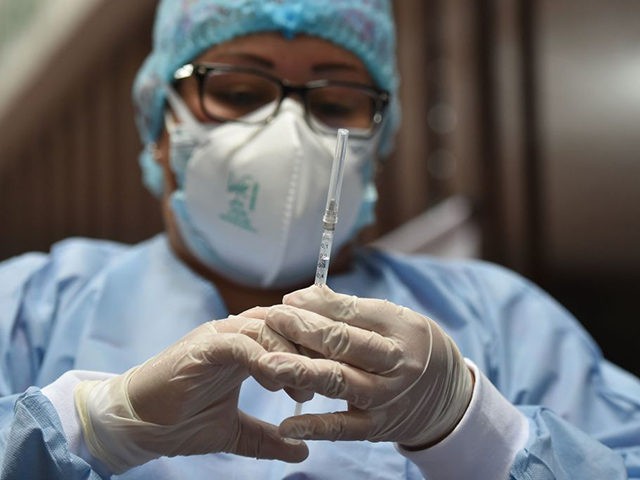Chinese officials announced Tuesday that Chinese companies manufacturing vaccine candidates against the Chinese coronavirus would significantly increase their production capacity to export billions of doses around the world.
The announcement, made at the Communist Party-led Boao Forum for Asia (BFA), followed an admission by the director of China’s Center for Disease Control (CDC), Gao Fu, this month, that Chinese-made coronavirus vaccines “don’t have very high protection rates.” It also comes amid concerns that Chinese citizens are not receiving vaccinations at rates equivalent to other large countries, in part due to distrust of the country’s vaccine manufacturers, leaving China exposed to deadly coronavirus outbreaks.
The Boao Forum is an economic summit meant to bring together Chinese allies to discuss the expansion of trade ties with Beijing.
The Communist Party is expecting to attract 200 million tourists for concerts and other super-spreader events for May 1, the global communist holiday colloquially known as “May Day.”
China expects to produce as many as 5 billion doses of multiple brands of Chinese vaccine candidates by the end of 2021, according to Zheng Zhongwei, director of the Development Center for Medical Science and Technology of the National Health Commission (NHC). The doses would reportedly meet both foreign and domestic demand.
“After production is properly established in the second half of this year, China will provide doses to more people in need through multilateral and bilateral measures,” Zheng reportedly added, according to the state-run Global Times newspaper.
To increase production, two of the nation’s largest pharmaceutical companies are planning to export vaccine technology abroad, the newspaper added.
“Yin Weidong, CEO of Chinese vaccine producer Sinovac Biotech, said at the Tuesday session that the company will try to realize technology transfer to 10 countries as soon as possible,” the Global Times stated. “Yu Xuefeng, chairman and CEO of another Chinese vaccine producer CanSinoBIO, said the company is considering technology transfer to some qualified countries like Mexico and Pakistan, so that countries in South America and Central Asia can get vaccines more conveniently.”
Sinovac is the developer of the first coronavirus vaccine approved in China, “Coronavac,” which has become China’s most prominent vaccine export during the pandemic. Yin said Tuesday that Sinovac had exported about 60 percent of the 260 million doses it had produced. CanSinoBIO’s product is in distribution in China but much less so internationally at press time.
The plan to export the technology made by Chinese companies would make Chinese vaccines much more prominent internationally, particularly in the developing world. The participants in the Boao Forum talk on vaccines said the goal was to “help address the global vaccine inequity issue,” meaning the disparate amount of access that citizens in developing countries have to approved Chinese coronavirus vaccines compared to those in wealthier countries.
The planned expansion of Sinovac and CanSinoBIO’s market share in the global vaccine race would follow skepticism from China’s CDC that the domestic products are especially successful at quelling outbreaks of the disease. The head of the agency, Gao Fu, lamented in mid-April that Chinese-made vaccines “don’t have very high protection rates” compared to those made in the United States. Gao appeared to blame the less innovative technology Chinese companies used, in contrast with American companies Pfizer and Moderna developing vaccines against the virus using novel mRNA technology.
“It’s now under formal consideration whether we should use different vaccines from different technical lines for the immunization process,” Gao said. “Everyone should consider the benefits mRNA vaccines can bring for humanity. We must follow it carefully and not ignore it just because we already have several types of vaccines already.”
China’s drug watchdog began the process to approve the distribution of the Pfizer product shortly after Gao’s comments – leading the Chinese state media emphatically noting that Chinese firm Fosun Biotechnology had also invested in its development but did not participate in its creation — even though Gao insisted that media quoting his remarks had caused a “complete misunderstanding.”
Both the Pfizer and Moderna vaccines tested at about 95 percent efficacy at preventing infections of Chinese coronavirus in clinical trials. Sinovac’s product tested at 50.38 percent efficacy in clinical trials; vaccines are expected to hit 50-percent efficacy to reach approval for widespread use. CanSinoBIO claimed its product tested at about 68.83 percent efficacy, dwindling over a six-month period.
At least ten countries have purchased the Sinovac product, leading to concerns that populations expecting high protection rates from mass vaccination may not, in practice, be as immune to the virus due to the vaccine’s high failure rate. Among the most scrutinized recent cases is that of Chile, where about 93 percent of people who have been inoculated received Coronavac doses. Chile experienced an unprecedented surge in coronavirus cases shortly after the height of its vaccination drive.
The widespread use of Chinese-made vaccines abroad has also led to some increases in vaccine hesitancy. In Africa, Bloomberg reported this week, many citizens distrust China after years of racist policies through its Belt and Road Initiative (BRI).
“In Zimbabwe, the barrier that hesitancy presents is particularly stark. Last month’s survey of 561 people by the Zimbabwe Christian Alliance showed 75 percent were unwilling to be vaccinated,” Bloomberg noted. “The source of its supplies, China, inhibits many from taking the shots.”
China is also struggling to convince residents at home to use Chinese products. In Hong Kong, a string of deaths linked to Coronavac has prompted a nosedive in appointments for vaccinations. Coronavac is not approved for use in the elderly — the victims in the deaths — in China, but it is in Hong Kong. In communist China, long memories of several major scandals involving faulty or watered-down vaccines have joined with the government’s long-implemented messaging that the local coronavirus epidemic ended a year ago to result in little interest in experimental vaccination.

COMMENTS
Please let us know if you're having issues with commenting.